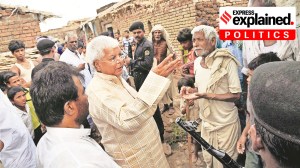Say talaq to triple talaq
It is often claimed that the Shariat (Islamic law) permeates almost every branch of Islamic literature, that it is the epitome of the true...

It is often claimed that the Shariat (Islamic law) permeates almost every branch of Islamic literature, that it is the epitome of the true Islamic spirit, the most decisive expression of Islamic thought, the essential kernel of Islam. Consequently, it has been argued that any legislative change in the Muslim personal law would violate the fundamental rights guaranteed in the Indian Constitution. The argument is contested, but the All-India Personal Law Board (AIPLB) failed to take an explicit stand at their recent meeting in Bangalore. It is no longer possible to keep deferring an issue that is not only affecting Muslim women but is also so central to their future welfare and security.
Already, demands for judicial activism and pressure are mounting from some Muslim women organisations to amend the laws relating to triple talaq’. Time and again precedents from other Muslim countries, including Pakistan, are cited to clamour for some measure of reform in the Muslim personal law. Members of the AIPBL would do well to pay heed to the imperious call of changing pattern of modern life, and the necessity of attempting a larger synthesis after the manner of the various forward-looking movements of Islam; this is a process which is not the dead and immobile one that superficial observers of Islamic history have usually taken it to be.
Islam persists, not through rigid negation of the forces of changing environments and new epochs or fresh historical and social impacts but through the adaptation to these conditions. And the fact that Islam has survived the endless vicissitudes of history conclusively proves that it adapted itself from age to age and epoch to epoch to the changing outer conditions. "Do not put to me too many unnecessary questions", the Prophet is reported to have said. "Whoever does it is an enemy of the Muslims because the answers given would become binding on them and thereby the liberty of action would be curtailed". Maybe, this is what inspired poet-philosopher Mohammad Iqbal to state that the claim of his generation to reinterpret the fundamental legal principles, in the light of their own experience and the altered conditions of modern life, was justified.
Today, the contentious issue is not the preservation of Muslim identity’, expressed through mosques, religious institutions, the traditional system of education and charitable institutions. There is an overall consensus, despite the spurt in majoritarian stridency, on guarding minority rights provided by the Constitution. Nor is the sanctity of the Shariat in question, though the 14th century historian Ziauddin Barani, representing Muslim orthodoxy, had conceded that the Sultan was empowered to enact state laws (zawabit) even if in extreme cases they had to override the Shariat. Likewise, Ferishta observed two centuries later that it was not possible to rule Hindustan in accordance with the Shariat. At the heart of the present debate, so argued the Deoband-educated Maulana Said Ahmad Akbarabadi in the 1960s, is the distinction between those Quranic injunctions that were specific to the Arab customary law of the time and those applicable to Muslim societies in other times. This distinction has been made inthe past, and that alone enabled Islam to pass through many stages of reorientation and readjustments. The scholar of Islamic jurisprudence, A.A.A. Fyzee, positioned himself against the traditional belief that in Islam law and religion are coterminous. He argued that law is a product of social evolution and it must change with time and circumstances.
In the past, the AIMPLB has not been impressed with these arguments; I doubt if they think differently now or are sensitive to the powerful and successful reformist initiatives in Muslim societies. They may settle, in response to certain court judgements, for a few cosmetic changes without satisfying the growing and persistent demands for gender justice for Muslim women. Perhaps, the only way out is to ask for a referendum or bring about some form of consensus (ijma, the most important legal notion in Islam) not on the enforcement of a uniform civil code but on substantial reforms in the provisions on triple talaq’ and maintenance for the Muslim widows.
Doubtless, this is a limited agenda, and yet the urge for reforms must come from the community itself. One hopes that patience, persistence and education will lead to a reappraisal of existing attitudes and that more and more educated Muslims will take recourse to ijtehad (exercise of independent judgement), defined by Iqbal as "the principle of movement" in Islam. Who knows, some day a version of the Mutazalites (in Baghdad) may strike a favourable chord? In the 9th century, they championed reason as judge in matters of belief. According to them, the inner meaning of scriptures could be ascertained only by reason. In its historical sequence, the existing debates, though clouded by fresh controversies after the Shah Bano judgement, owe their origin to the discussions in the Constituent Assembly and Jawaharlal Nehru’s subsequent ambivalence in deciding whether or not to provide equality before the law for all Indian women. He may have been right in thinking that the time was not ripe for bringing Muslimswithin the preview of a uniform civil code, but the initiative on such matters should have rested with Parliament and not the religious traditionalists and the defenders of the status quo.
Not many people know that Nehru’s Cabinet received suggestions, in 1961, for reviewing and reforming the Muslim personal law. Nehru was himself enthusiastic, pointedly mentioning the changes that had taken place in Tunisia, Egypt and Pakistan. Lengthy discussions followed, and the Law ministry was asked to make appropriate recommendations. But the mere hint of an inquiry in the ministry’s report led to a public outcry. A gathering of Muslim ministers and MPs, chaired by Zakir Husain, the vice-president of the Republic, echoed their sentiments without any serious deliberation.
No government after Nehru could contemplate reforms to ensure the equal status of Muslim women. Electorally, the risk was too great. In consequence, state intervention in the Shah Bano case came about with an eye on the "Muslim vote" and to defend a traditionalist interpretation of the Shariat, which was untenable in most Muslim societies. This is because the political regime, acting in unison with the Muslim orthodoxy, had legitimised the AIMPLB members as the sole custodians, interpreters and transmitter of the Shariat. Nonetheless, let us hope that the eclectic spirit of the Prophet’s message is not throttled, its theology not gagged by history and its vitality not sapped by totalitarianism. In the words of Fyzee, there is a strong case for releasing the spirit of compassion, fraternity, tolerance and reasonableness.



- 01
- 02
- 03
- 04
- 05




























